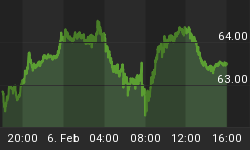In their new book, Peak Prosperity's Chris Martenson and Adam Taggart don't sugarcoat the thesis, which is basically the end of the world as we know it.
It seems that three major trends are colliding:
-
A global financial system that has to grow exponentially to avoid implosion (regular visitors to DollarCollapse.com will be quite familiar with this).
-
An overburdened environment that can't support a growing population.
-
The end of cheap energy. This might take a little explaining in a period of plunging oil prices, so... Back when finding oil meant poking a random hole in the Saudi Arabian desert, it required very little energy to get more energy. But as we've used up these easily-accessible reserves and moved on to tougher nuts like offshore wells under miles of choppy sea or tar sands that strenuously resist being turned into usable oil, the calculus has become a lot less favorable. In other words, it takes an ever-larger amount of energy to make more energy.
And since modern society (i.e., suburbanites driving thousands of pounds of metal long distances to work, shop and play while heating/cooling McMansions) requires ever-increasing amounts of cheap energy, this era is will soon be replaced by a reality for which most people are totally unprepared.
As Martenson and Taggart put it:
Our culture, our economy, our jobs -- progress and society itself -- all exist due to surplus energy. Whether the world can produce 100 million barrels of oil per day or just 50 million is far less relevant than how much surplus energy there is to support the rest of our complex economy and the way of life we consider to be normal.
For those of us who have studied what life will look and feel like under these conditions, the answer is obvious. We will inherit a future defined by less of everything. The world will be a far less dynamic, less easy place to live with a much-simplified economy, reduced travel, and vastly fewer -- or at least very different -- opportunities compared to today.
This is very well said, but not exactly unfamiliar. Gloom and doom polemics have been around since Silent Spring and The Population Bomb terrified our parents. But where most books in this genre limit themselves to one or two aspects of what is clearly a multifaceted challenge, Martenson and Taggart paint with a broader, more useful brush, offering a comprehensive plan for redesigning one's life to match the coming times.
The world, they predict, is going to throw us some curve balls (that is, society's "narratives" are going to fail and be replaced), so no rigid set of skills, assets or attitudes are guaranteed to work. Much better to instead acquire resilience, the ability to roll with the punches and adapt to quickly-changing circumstances. Put another way, capital comes in many forms beyond financial. Emotional and societal capital -- in the form of a flexible, positive attitude and lots of useful personal connections -- will end up being even more important than gold coins buried in the back yard (though don't skimp on those).
The bulk of Prosper! offers advice on acquiring the various kinds of capital, broken up into units ranging from stress reduction to permaculture to stockpiling. (Actually all of this seems aimed at stress reduction in the sense that the more prepared you are for turmoil the less it -- and the anticipation of it -- will stress you out).
The final chapter presents the stories of people who have put Peak Prosperity themes into practice by moving from city to small town, developing crucial skills and/or building connections with neighbors who might help when things go sideways. Most of these tales work as both interesting narrative and useful lesson.
The wide-ranging nature of this book means that it can replace a stack of financial and self-help manuals. And the hopeful nature of the advice will leave readers energized rather than depressed. This is, in short, a great first step in building a well-rounded life that will be an island of stability in a very rough sea.















